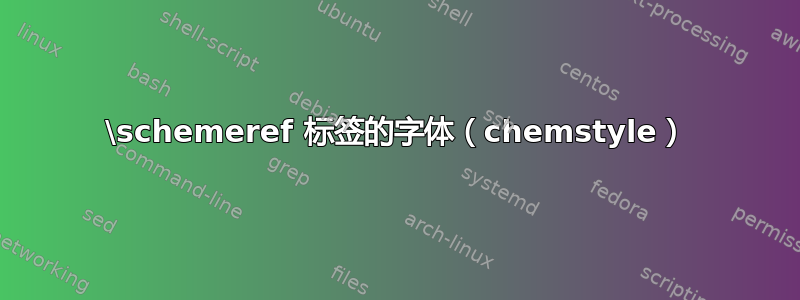
我使用 Chemstyle 标记论文中的化合物,并使用 \renew 命令调整标签大小。但是,这似乎也会改变字体。我需要数字采用 Arial 8 pt 或其他无衬线字体。
以下是一个例子:
\documentclass[11pt,oneside,a4paper]{report}
\usepackage[left=4.0 cm,right=2.0 cm,top=2.0 cm,bottom=2.0 cm]{geometry}
\usepackage{graphicx}
\usepackage{chemstyle}
\renewcommand*{\schemerefformat}{\fontsize{5pt}{6pt}\textbf{}} %set size of chemlabels
\begin{document}
\leavevmode\compound*{cmpd1}
\compound*{cmpd2}
\compound*{cmpd4}
Arene \compound{cmpd1} was used to obtain a diastereomeric mixture upon complexation that was easily separable by column chromatography (\ref{sch2}). After hydrolysis of the ester the two enantiomeric complexes \textit{pS}-\compound{cmpd4} and \textit{pR}-\compound{cmpd4} were obtained.
\begin{scheme}[htbp]
\centering
\caption{Chiral resolution.}
\schemeref[TMP1]{cmpd1}
\schemeref[TMP2]{cmpd2}
\schemeref[TMP4]{cmpd4}
\includegraphics[width=0.82\textwidth]{1-3.eps}
\label{sch2}
\end{scheme}
\end{document}
输出结果如下:

如果需要的话,这是 MWE 的 Dropbox 链接:包含示例和图像的 Dropbox 文件夹
答案1
您不需要通过添加粗体格式\schemerefformat- 将标签设置为粗体是由提供化合物编号的底层包完成的。除非另有说明,否则这是chemcompounds包。\schemerefformat添加额外的方案中标签的格式。默认情况下,其定义是
\newcommand*\schemerefformat{\textsf}
IE它使用无衬线字体作为方案中的标签。请注意,它使用\textsf 没有尾随论点。你的定义
\renewcommand*{\schemerefformat}{\fontsize{5pt}{6pt}\textbf{}}
做不是使用无衬线字体,这就是为什么你得到 none。\textbf{}由于你向 添加了空参数,因此也没有效果\textbf。标签仍然是粗体,因为正如我上面所说,这是由 完成的chemcompounds。
你需要一个像这样的定义
\renewcommand*\schemerefformat{\tiny\textsf}
另外,使用(不带参数的字体开关)的定义也\sffamily可以:
\renewcommand*\schemerefformat{\tiny\sffamily}
由于我无法在您提供的 Dropbox 链接中找到 EPS,因此我对以下示例使用了不同的方案:
% arara: pdflatex: { shell: on }
% arara: pdflatex: { shell: on }
\documentclass{article}
\usepackage[T1]{fontenc}
\usepackage{graphicx}
\usepackage{chemstyle}
\usepackage[runs=2]{auto-pst-pdf}
\begin{document}
\compound{cmpd1,cmpd2}
\begin{scheme}[htbp]
\centering
\caption{First example}
\schemeref[TMP1]{cmpd1}
\schemeref[TMP2]{cmpd2}
\includegraphics{scheme-tmp.ps}
\end{scheme}
\renewcommand*{\schemerefformat}{\tiny\textsf}
\begin{scheme}[htbp]
\centering
\caption{Second example}
\schemeref[TMP1]{cmpd1}
\schemeref[TMP2]{cmpd2}
\includegraphics{scheme-tmp.ps}
\end{scheme}
\renewcommand*{\schemerefformat}{\footnotesize\itshape\sffamily}
\begin{scheme}[htbp]
\centering
\caption{Third example}
\schemeref[TMP1]{cmpd1}
\schemeref[TMP2]{cmpd2}
\includegraphics{scheme-tmp.ps}
\end{scheme}
\end{document}



